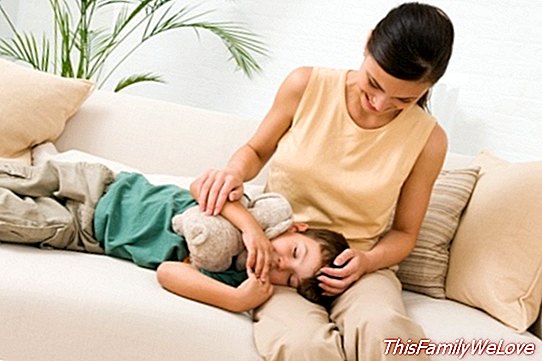Unidentified pain is what most concerns 56% of mothers

The fever puts the mothers on notice and the vomits alert them. The greatest fear of Spanish mothers, both experienced and new, is that your children become sick. According to a survey conducted by the Spanish Society of Outpatient Pediatrics and Primary Care (SEPEAP) in collaboration with Mylan, this concern is placed above the economic situation of the family (37.9%), the identification of the reason for crying (32.7%) or the availability of sufficient time to invest hours in care of their children (35.5%).
The study was conducted on a sample of 1,000 mothers aged between 18 and 45 years. Their results reveal that unidentified pain is what most concerns 56% of mothers. To reach the conclusions presented, a barometer has been used to analyze the reaction of mothers when they detect that their child is ill. It has been called "Tranquility Barometer".
The resource of self-medication
The small health problems that most distress mothers are that their child has a fever, vomiting or diarrhea, which they represent 81.4% of the answers. Many of the respondents state that when they are new mothers and lack experience, they feel more nervous. In contrast, with the second and third children, most say they are more relaxed. Both in the first case and in the second, mothers usually resort to paracetamol or ibuprofen. Some use it as a first resource and others, however, prefer to take the child to the pediatrician before providing any type of medication.
Use the pediatrician
Going to the pediatrician is, without a doubt, the most advisable according to the SEPEAP, since the ideal thing is always to be able to identify the origin of the fever as soon as possible. Keep in mind that neither the degree of fever nor the response to the antipyretic we use will guide us on the severity of the infection that the child has.
The pediatrician is the professional who can identify if the problem has been caused by a virus or bacteria. Therefore, only from the diagnosis of a specialist can the child be prescribed the remedy that best suits their needs. In addition, in this way, we greatly reduce the always present possibility of the child having an allergic reaction.
Mothers who resort to medicines in the first instance and those who act in reverse agree to apply baths of warm water to the child if they do not detect that the fever goes down, something that the Spanish Association of Pediatrics strongly discourages through its Decalogue of the Fever.
On the other hand, as revealed by the Tranquility Barometer, 47% of mothers indicate that they sometimes combine or alternate analgesics, a practice that also rejects AEPED. The reason is that 43% of mothers say they notice more improvement with an analgesic than with another. Proof of this is that, in the video disseminated by the entities responsible for the study, one of the mothers interviewed stated that "at half an hour, ibuprofen is noticed", but also recognizes the use of paracetamol. Which many other mothers do, either because their children like it better or to prevent possible stomach pains, because it is well known that those products that contain ibuprofen as an active ingredient do not always feel good. Much less if you take it on an empty stomach or without having eaten enough.
Decalogue of AEP fever
Although diarrhea and vomiting are also two of the small health problems that most concern mothers, fever is undoubtedly the most active alert. Arrived for that reason at this point it is necessary to make mention to the main points of the decalogue of the fever elaborated by the Spanish Association of Pediatrics.
- Fever is not a disease. It serves to defend against the infections caused by both viruses and bacteria.
- Fever, by itself, does not cause brain damage, neither blindness, deafness, nor death.
- Some predisposed children may have seizures, but treating fever with medication does not prevent it.
- You only have to use medicines for fever if there is discomfort and pain.
- Ibuprofen and paracetamol have the same efficacy.
- Bathrooms are discouraged, rubbing with alcohol and the use of damp cloths, as well as removing the child too much.
- It is convenient that the child is always well hydrated. You will be offered liquids often and, if possible, with carbohydrates.
Elisa García




